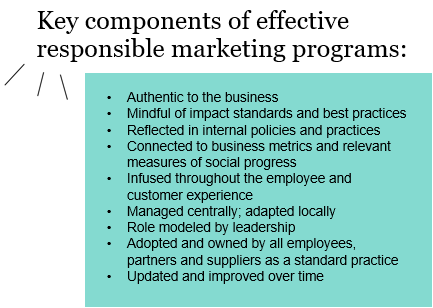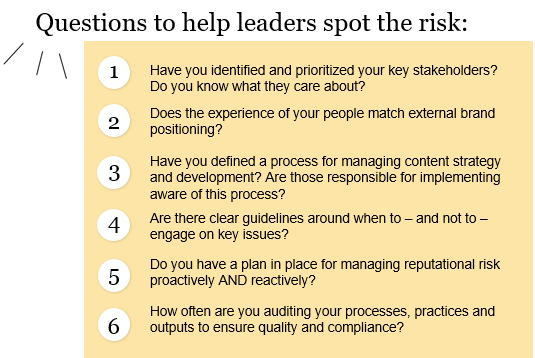Adopting a “responsible marketing” approach helps companies protect against – and more quickly recover from – threats to company reputation.
Increasing polarization. Heightened demands to take a stand. Real business impacts for getting it wrong. Never has it been so important for businesses, brands and leaders to stand for something. Or more critical for potential related threats to be identified, considered and addressed. Added to the long list of growing expectations of executives are the roles of purpose champion and brand protector; positions that grow more complicated by the day.

Research shows that on average, companies that align their brand to a higher purpose achieve better business results. For example, when it comes to financial strength, brands that focus on improving quality of life outperform the stock market by 120%. Similarly, the modern workforce prioritizes culture, diversity, and high impact over financial benefits; and 63% of consumers prefer to purchase from purpose-driven brands.
But, as we are increasingly seeing, leading with purpose can also expose brands to reputational – and by extension business – risk. Watchdog organizations are tracking publicly-available information to either call out companies perceived as “woke” OR expose gaps between responsible business-focused statements and practice. Media coverage of topics considered “woke” trends negative, and companies can find themselves called out for either supporting or falling short of commitment.
While purpose-driven brands are experiencing increasing opportunities and challenges, they are not the only ones who are at risk. We are at a moment when the question is no longer if a brand will be called out but when and by whom. The most effective leaders will see this as an opportunity to prepare their organization to be strong enough to minimize and withstand threats to brand and reputation.
How? By adopting a “responsible marketing” approach and infrastructure.

For years we have helped our clients to build back reputation with employees, consumers, regulators and investors following reputational crises. More recently as pressures to engage have mounted, we’ve worked with organizations across industries, including well-known brands, multinational companies and government agencies to get ahead of these issues by assessing and strengthening marketing and communications policies, protocols and systems and defining an approach to engaging around societal issues.

Here are the steps that all organizations should be taking to maximize brand value while at the same time minimizing risk:
- Define “Responsible Marketing” and supportive policies aligned to your brand. At the most basic level, organizations must start by simply and clearly articulating what responsible marketing means and why it matters to the company, and who benefits. The definition should be supported by foundational policies that guide how it is activated in marketing and communications programs.
- Expand internal policies into a published Code. Leaders can learn from companies in more highly-regulated industries such as food and beverage that take responsible marketing a step further through the development of a more formal “Code” that is aligned to mission, policies and impact standards. In many cases, these Codes are tied to broader company policies and also adapt guidance published by broader industry associations and non-profits such as the International Chamber of Commerce and World Health Organization.
- Establish a governance model including dedicated resources to protect investment in responsible marketing. Though everyone who has responsibility for enhancing and protecting brand also has responsibility for doing so responsibly, in order for a formal program to work it needs formal leadership. In many cases, this means bringing together existing resources and team members who might be operating in silos together into a more formal structure. In other cases, it means moving responsible marketing from being a side project to being a dedicated role with associated key performance indicators. Ultimately this team must work together to ensure accountability and oversight of the Code, including adherence and incorporating updates and best practices.
- Continue to revisit the Code. Stakeholder expectations change. Putting into practice a Code might expose areas that need to be strengthened. A Code should be considered a living document that is updated regularly, and at least annually, as the business context and media landscape evolves.
As the old adage says, the best offense is a good defense. In an environment where organizational accountability remains paramount, brands must do the hard work to define who they are and stand confidently in their values to maintain the credibility to protect against and respond to reputational threats.
United Minds is a Weber Shandwick consultancy dedicated to making business more human. To learn more, reach out to contactus@unitedmindsglobal.com.






